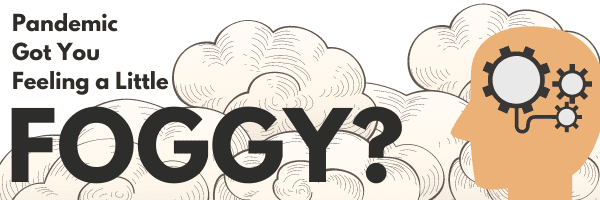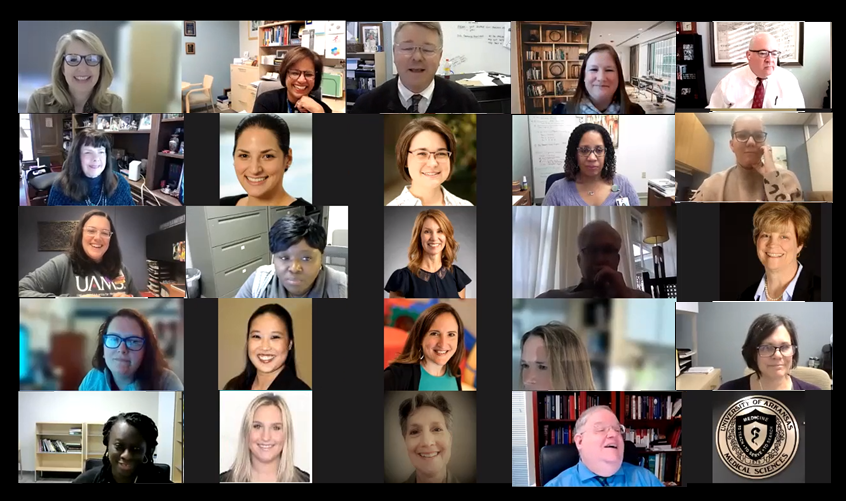
Feeling a little “foggy”? Worried about lacking “bandwidth” to accomplish things that once seemed doable? Or maybe you are struggling with “decision fatigue.”
College of Medicine Dean Susan Smyth, M.D., Ph.D., and other leaders launched “COM Conversations,” a new virtual journal club and discussion group open to everyone in the COM, with a Jan. 11 Zoom discussion on how the prolonged pandemic is impacting our stress levels, memory and more – and what we can do about it.
“I wanted to start this conversation by saying that if you are feeling stressed or overwhelmed, you are not alone,” Smyth told some 60 participants. “This really is affecting all of us in one way or another, and there are normal responses to facing trauma and to being under stress.”
Smyth offered her own anecdotes about forgetting certain things. Others chimed in with their own experiences and concerns, drawing commiserating nods from colleagues:
I wonder what will our “new normal” will look like.
I find myself not having the bandwidth to accomplish what I used to manage.
I have been struggling with decision fatigue.
It is hard to always be at 100% for our patients when in a chronically stressed state.
Dr. Smyth, along with Associate Dean for Students Sara Tariq, M.D., and UAMS Center for GME Director Jim Clardy, M.D., recommended articles in Psychology Today and Sharp Health News about pandemic-related memory issues and strategies for coping.

Dr. Clardy, a Professor in the Department of Psychiatry, shared additional insights, emphasizing that some forgetfulness during this extremely challenging time is normal. “You don’t have a memory until you ‘make’ one, and when you are chronically stressed and you’re thinking about 10 different things at once, the memory just doesn’t go in,” he said. “One answer to that is to be aware of how quickly you are moving, and pause and just say, ‘I’ve got to remember that.’”
Fatigue and stress also frequently impact how one acts around others. “Some of us get giddy; some of us get angry,” Dr. Clardy said. “And you can swing from one to another really quickly.” Those who are extremely tired and stressed often exhibit disinhibition. “If you do or say things you wouldn’t usually do or say, you are being disinhibited,” he explained.
A third effect of the challenges and constraints of the pandemic – as with other circumstances that result in severe fatigue and stress – is a loss of one’s ability to creatively solve problems, Dr. Clardy said. “I sometimes give myself a self-check by doing a Sudoku puzzle,” he said. “On days when I am really, really tired, I make all sorts of mistakes, and I just kind of laugh about it.”
“The main point I want to say is, we are all in this together,” Dr. Clardy said. “And if you are not completely ‘OK,’ that would probably be about normal right now.”
For those of us who are having trouble finding the “bandwidth” to deal with today’s myriad challenges, Dr. Tariq, a Professor in the Department of Internal Medicine, shared a metaphoric story she learned from Puru Thapa, M.D., MPH, a Professor of Psychiatry who leads UAMS programs in mindfulness and faculty, resident and student wellness.

It is the tale of a wise woman who is approached by a person who is extremely stressed. The wise woman advises the person to taste a glass of water laced with a teaspoon of salt. After exclaiming how awful the water tastes, the stressed-out person is directed to take a drink from a bucketful of water containing a teaspoon of salt. It tastes better, of course. Finally, the person is instructed to taste water from a stream containing a teaspoon of salt, and it tastes amazing.
“So the moral of the story that Dr. Thapa told me was – build capacity,” Dr. Tariq said. “Your goal is to be like the stream.”
Building personal capacity will differ from person to person, she said, citing exercise and turning off email earlier in the evening as a couple of possibilities, along with the tips shared in the Psychology Today and Sharp Health News articles.
Dr. Smyth noted the importance of paring back some activities whenever possible. “I think it is very hard for those of us who are in health care to give up certain responsibilities,” she said. “We need to recognize that and that it is OK that we can’t get everything done.”
Dr. Smyth hosted a second “COM Conversations” on January 25 with a journal club style discussion of “5 Things High Performing Teams Do Differently,” an article by Ron Friedman in the Harvard Business Review. Upcoming sessions, about once a month, will focus on workplace topics, leadership development and other issues suggested by College of Medicine faculty, staff, residents, fellows and students.
